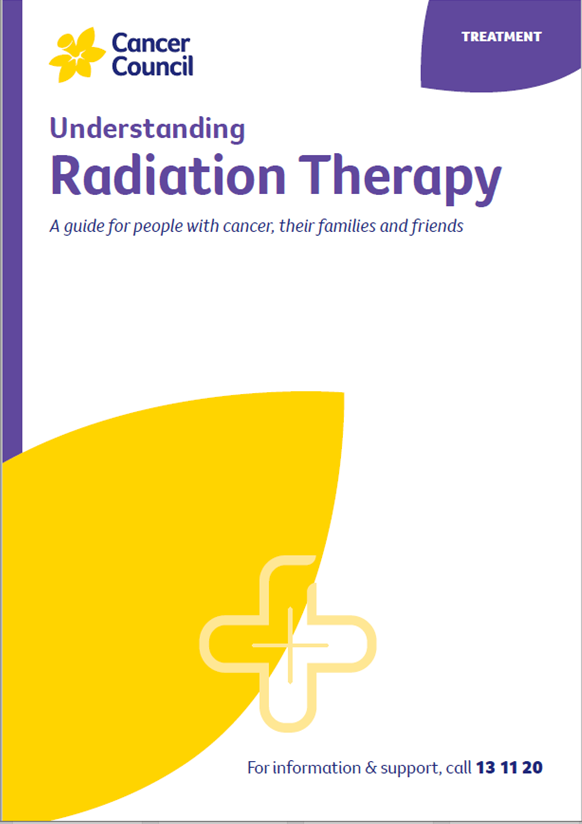- Home
- Oesophageal cancer
- Treatment
- Radiation therapy
Radiation therapy for oesophageal cancer
Also known as radiotherapy, this treatment uses a controlled dose of radiation, such as focused x-ray beams, to kill or damage cancer cells. The radiation is targeted at the cancer, and treatment is carefully planned to do as little harm as possible to healthy body tissue near the cancer.
Learn more about:
- How it is given
- Side effects of radiation therapy
- What is chemoradiation?
- Video: What is radiation therapy?
How it is given
Radiation therapy is the main treatment for oesophageal cancer that has not spread to other parts of the body and cannot be removed with surgery. It may be given alone or combined with chemotherapy (see chemoradiation). Chemoradiation is often used 1–3 months before surgery to shrink large tumours and destroy any cancer cells that may have spread.
Before starting treatment, you will have a planning session that will include a CT scan. Some small permanent or temporary tattoos may be made on your skin so that the same area is targeted during each treatment session.
For more on this, see our general section on Radiation therapy.
Side effects of radiation therapy
The lining of the oesophagus can become sore and inflamed (oesophagitis). This can make swallowing and eating difficult. In rare cases, you may need a temporary feeding tube to help you get enough nutrition. Other possible side effects include fatigue, skin redness, loss of appetite and weight loss. Most side effects improve within about 4 weeks of treatment finishing.
Very rarely, long-term side effects can develop. The oesophagus can develop scar tissue and get narrower (called oesophageal stricture). Stretching the walls of the oesophagus (dilatation) can make it easier to swallow food and drink. Radiation therapy can also cause irritation and swelling (inflammation) in the lungs, making you short of breath.
My diagnosis of oesophageal cancer came as a complete shock. I had chemotherapy and radiation therapy to shrink the tumour, and then went home to recover for six weeks before surgery.
John
→ READ MORE: Chemotherapy for oesophageal cancer
Video: What is radiation therapy?
Watch this short video to learn more about radiation therapy.
Podcast: Making Treatment Decisions
Listen to more episodes from our podcast for people affected by cancer
More resources
Prof David I Watson, Matthew Flinders Distinguished Professor of Surgery, Flinders University, and Senior Consultant Surgeon, Oesophago-Gastric Surgery Unit, Flinders Medical Centre, SA; Prof Bryan Burmeister, Senior Radiation Oncologist, GenesisCare Fraser Coast and Hervey Bay Hospital, QLD; Kieran Cahill, Consumer; Jessica Jong, Clinical Dietitian, Upper GI and Hepatobiliary Services, Peter MacCallum Cancer Centre, VIC; John Leung, Consumer; Prof Rajvinder Singh, Professor of Medicine, University of Adelaide, and Director, Gastroenterology Department and Head of Endoscopy, Lyell McEwin Hospital, SA; Dr Sarah Sutherland, Medical Oncologist, Chris O’Brien Lifehouse, NSW; Paula Swannock, Upper GI Cancer Nurse Consultant, St Vincent’s Hospital Melbourne, VIC; Rebecca Yeoh, 13 11 20 Consultant, Cancer Council Queensland.
View the Cancer Council NSW editorial policy.
View all publications or call 13 11 20 for free printed copies.


